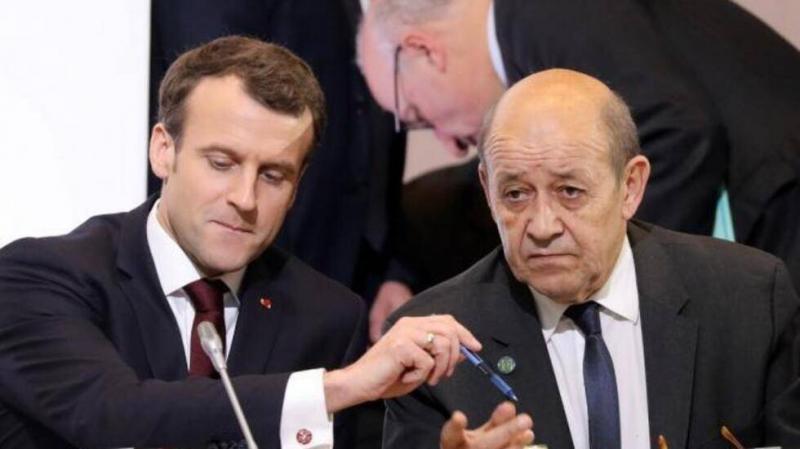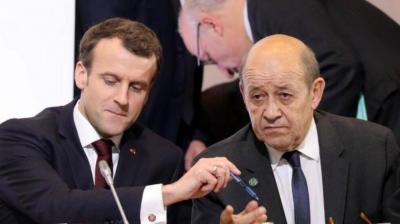Since his appointment as a presidential envoy to Lebanon, Jean-Yves Le Drian has been attempting to succeed in an almost impossible mission to urge Lebanese parties to agree on electing a president. Le Drian has another task this week that may seem similar to previous missions, although French circles believe there is a new dynamic from the meeting of the ambassadors of the quintet committee, who insisted that a presidential election should take place before the end of May. This brought an exaggerated sense of optimism, as the division remains the same and has intensified with the Israeli war on Gaza and Hezbollah's intervention to support Hamas, which has led the Lebanese opposition to unite against the coordination of Palestinian and Lebanese arenas, as stated in "An-Nahar."
In such circumstances, the Iranian-affiliated party will not withdraw its candidate, Suleiman Frangieh, for fear that it would be seen as a sign of weakness towards others. Le Drian's task is to rely on transitioning to a third candidate and to open Parliament for a session of election that seems to be exceedingly complicated once again. However, French President Emmanuel Macron does not bow to the failure of his envoy. Like his predecessors, he insists on attending to Lebanon and is currently the only one in the West concerned with the presidential election in the country and preventing it from waging an Israeli war.
When Macron says he is ready to visit Lebanon to pressure the parties or gather them in France, he notes that President Najib Mikati, Joseph Aoun, and Walid Jumblatt advised him against visiting Lebanon, as did his team of advisors. Mikati and Aoun felt that a visit from the French president to Beirut while the country is without a president is not advisable, while Jumblatt sees it as unhelpful unless the outcome is guaranteed beforehand. Ultimately, the French president will make the decision himself and may take the risk of visiting from a position of strong will and self-confidence that he will succeed, especially since he responds to those who told him to wait until there is a president by noting that Lebanon has been without a president for two years, so why wait?
Macron contacted Saudi Crown Prince Mohammed bin Salman last weekend and discussed the Lebanese presidency among other topics, believing that Saudi Arabia, with its weight and history, can influence matters towards electing a president and encouraging the parties to agree on a candidate. Now, with the diplomatic relationship between Saudi Arabia and Iran restored, the possibility of reaching an agreement on successful presidential elections in Lebanon is feasible if the Kingdom wants to play a role in this regard and convince the Iranian side to pressure Hezbollah to facilitate the presidential election and not obstruct parliamentary sessions.
Macron, like his predecessors, particularly President Jacques Chirac and President François Mitterrand, has a special interest in Lebanon and is following this country's file similarly, even though he has only succeeded so far in visiting after the Beirut Port explosion. He believes that France's presence and role in the Middle East are through Lebanon. France's history in Lebanon reflects the attention of presidents towards this country. When Lebanon was under Israeli bombardment in 1982, Mitterrand held a summit with American President Ronald Reagan at the Palace of Versailles particularly dedicated to the Israeli invasion of Lebanon, attempting to halt it.
Additionally, Chirac's close relationship with President Rafik Hariri drove him to make massive efforts to assist Lebanon economically even after the Paris II conference. Former Saudi Foreign Minister Prince Saud al-Faisal told the Lebanese press, "I tell the Lebanese, what a lucky thing they have in President Chirac," as Chirac insisted on the funders during the conference to help Lebanon. Chirac also skillfully persuaded Russian President Vladimir Putin to abstain from voting on Resolution 1559 regarding Syria’s withdrawal from Lebanon and not use the veto, managing to secure nine votes in favor of the resolution.
Furthermore, Macron is also the only one discussing Lebanon with his counterparts. When he hosted Arab League and Islamic Conference ministers a few days ago, he was the only one who spoke of the necessity of sparing Lebanon from a broader war. France has presented Macron's French paper in this context to prevent the expansion of the war, but the question remains: will Israel be convinced, and will Hezbollah cease fire on Israel? War in Lebanon is a disaster for the country and not in the interest of the Jewish state, which could open a third war front for its army. Le Drian’s visit to Beirut will not bring anything new, except that it comes after Macron's call with Prince Mohammed bin Salman and before his meeting with President Biden in Normandy on June 6, with Macron affirming that Lebanon will be among the topics he will address with him, according to "An-Nahar."




